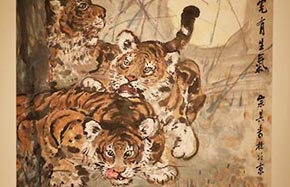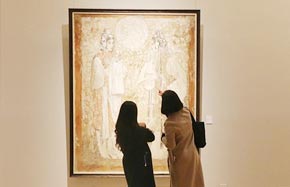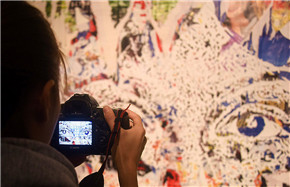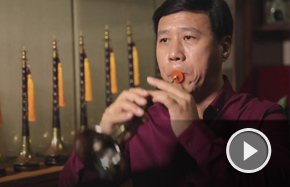Ancient sounds, modern music
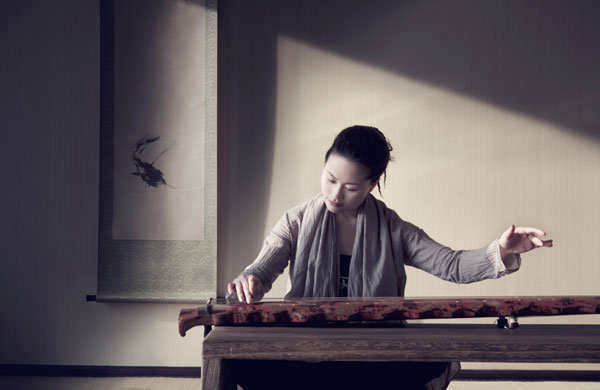 |
|
Wu Na started learning guqin at age 9, and now plays contemporary music with the ancient instrument. Photos provided to China Daily |
Wu Na has been playing the guqin for 23 years, and is passionate about modernizing the traditional instrument. Chen Nan chats to the musician about her plans to bring the seven-stringed zither to a wider audience.
In 1992, when 13-year-old Wu Na was studying guqin (seven-stringed zither) at the Affiliated High School of Central Conservatory of Music, she was given a cassette from her roommate called China Dream. It was a recording featuring Dutch jazz flutist-composer Chris Hinze, veteran Chinese guqin player Cheng Gongliang, American coloratura soprano Claron McFadden and Indian percussionist Ramesh Shotham. Wu, who started learning guqin at 9, was captured by the sounds created by the four artists. She played the cassette day and night.
"All I learned about guqin was its history and tradition. But I had never heard this kind of interpretation of the instrument," recalls Wu, 34. "There was a voice telling me that this is the kind of music I should make."
Since then, the musician, who has been playing the guqin for 23 years and is the first musician in China to receive a Master's degree in guqin performance, started combining guqin with other musical instruments and various music genres, such as jazz, electronica and rock.
At the Beijing One International Arts of Performance Festival concluded on Aug 18, Wu cooperated with French poet Philippe Tancelin and Chinese modern dancer-choreographer Hou Ying, performing a work that blurred the boundaries of poetry, dance and music.
Such a combination is definitely not new to the musician. In March 2010, she created the Guqin Stage at a theater in Fangjia Hutong, an art zone in Beijing. She teamed up with a variety of artists from around the world and brought a series of collaborative performances to the space, which incorporated tea ceremony arts, Kunqu Opera, painting, and calligraphy.
She has also worked with rock musicians such as Cui Jian, Dou Wei and Xu Wei, playing guqin at their concerts and recording studio albums. In 2006, she collaborated with the distinguished musician Liu Sola in a production of contemporary opera, The Fantasy of the Red Queen, in Berlin.
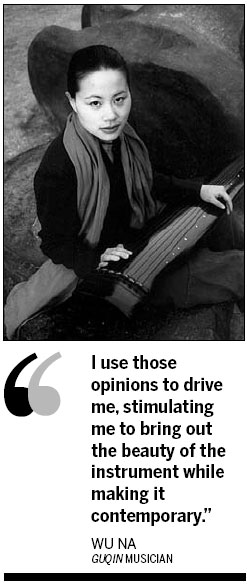
"All of those musicians have inspired me in exploring the possibilities of guqin. For example, Cui Jian is very strict about the fusion so he gave me very detailed requirements for each tune but Dou Wei just asked me to play whatever I wanted," says Wu, who later became Dou Wei's guqin teacher and made an album with him in 2005.
Dou, who was leading vocalist of the rock band, Black Panther, used Wu's photos on the cover of his experimental music albums in 2004 and 2005. He once described Wu as "a woman from ancient times".
The seven-stringed instrument, which is more than 4,000 years old, may not strike a chord with today's audiences. But in the eyes of Wu, from Chongqing, the guqin, which has long been favored by ancient scholars, is more than a simple instrument.
"It's a part of Chinese culture," she says. "For me, it is a lonely instrument entertaining myself. When I play guqin with other artists, it feels like seeking a soul mate via music."
The elegant device and beautiful sounds appealed to her when she was a child. When she first tried combining the instrument with contemporary music she focused on technique. She learned cello and bass to further research the different sounds which could be created by the guqin.
After years of testing, Wu says she learned about much more than just technique.
"We can never play the guqin like the ancient Chinese poet or scholars because we are living in the modern world. So I wanted to jump out of the box to seek a new world built upon my own understanding of the instrument," Wu says.
She has released five guqin albums, including Deform From Within and One Flower Is A World, merging her Chinese and western musical disciplines to create a new place for the instrument in contemporary music, which won her awards and opportunities to travel around the world to cooperate with foreign musicians.
However, there are some people who feel Wu's modern take on the ancient instrument has violated the rules of the instrument and diminished the traditions of the music.
"I use those opinions to drive me, stimulating me to bring out the beauty of the instrument while making it contemporary," says Wu.
She is currently preparing her guqin studio, located on the outskirts of Beijing, which will open in March next year. She will give guqin classes and also teach ancient Chinese art forms, including calligraphy and poetry.
"Back in 2003, I had a school teaching guqin but the feedback was not good. However, now guqin, like many other traditional Chinese cultural forms, has regained its popularity. I believe it is something deep inside Chinese people's hearts, which just waiting to be awakened," she says.







